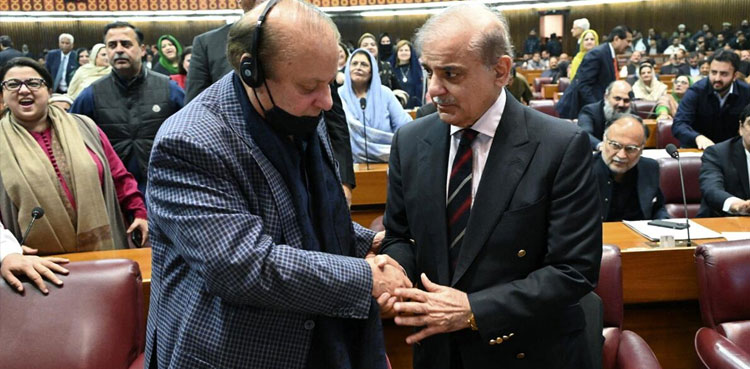LAHORE: Pakistan Muslim League Nawaz (PML-N) President Nawaz has expressed displeasure with the strategy adopted by his government regarding the constitutional amendment, ARY News reported citing sources.
The former premier, who reached Islamabad from his Jati Umra residence on Sunday, had returned to Lahore after expressing displeasure with his party.
Sources close to the party reveal that Nawaz Sharif was unhappy with the approach taken by Shehbaz Sharif and had decided to distance himself from the process.
Nawaz Sharif had arrived in Islamabad to attend the National Assembly session but did not meet with President Zardari and JUI-F Maulana Fazlur Rehman, despite efforts by the Prime Minister Shehbaz Sharif to facilitate a meeting.
Govt should have taken Fazlur Rehman into confidence before proceeding with the amendment, sources quoting Nawaz Sharif as saying.
The National Assembly is set to discuss and present a series of significant constitutional amendments in today’s session including increasing seats for Balochistan in the provincial assembly.
According to sources, over 20 clauses are expected to be included in the proposed changes, affecting various key articles in Pakistan’s Constitution, including Articles 51, 63, 175, and 187.
The constitutional amendments include increasing representation for Balochistan in the provincial assembly. The proposal aims to raise the number of seats in the Balochistan Assembly from 65 to 81, a move intended to ensure better representation of the province in legislative matters.
Another constitutional amendment, Article 63, deals with the disqualification of members of Parliament, and will also undergo significant changes. These changes include provisions regarding the voting behaviour of defecting members of the assembly.
Read More: PTI will first read and then decide on legislation: Gohar
Article 181 is also expected to be amended to allow for broader judicial reforms. One of the major judicial amendments proposes that the Chief Justice of Pakistan will no longer have their tenure extended, while Islamabad High Court judges may now be transferred to other provincial High Courts.
Another major constitutional amendment suggests that the appointment of the Chief Justice will be done by a panel consisting of the five senior-most judges of the Supreme Court.
This will mark a shift from the current procedure where the senior-most judge automatically becomes the Chief Justice. The remaining four judges of the Constitutional Court will be appointed by the government, further signalling a shift in the current appointment process of judges.
Furthermore, it will be decided that the Constitutional Court will hear cases related to constitutional matters concerning Articles 184, 185, and 186.
Additionally, in an effort to streamline the appointment process for judges in the Supreme Court and High Courts, the government will consolidate the Judicial Commission and Parliamentary Committee for a more efficient selection procedure.



Leave a Comment